Sustainable and Responsible Tourism Management: A Comprehensive Report
VerifiedAdded on 2023/01/05
|16
|5158
|2
Report
AI Summary
This report comprehensively examines sustainable and responsible tourism management, focusing on its evolution from the 1970s to the present, and highlighting the roles of organizations like The International Ecotourism Society (TIES) and GSTC. It explores the purpose and principles of tourism planning and development, emphasizing the importance of minimizing adverse effects and involving local communities. The report investigates the impacts of tourism activities, evaluates how sustainability principles are applied, and assesses sustainable tourism management in various destinations, using Switzerland as a case study. It covers the evolution of sustainable and responsible tourism, the roles and functions of global organizations, principles of planning and development, and the evaluation process, including associated challenges. The report concludes with an overview of the findings and insights into the future of sustainable tourism.
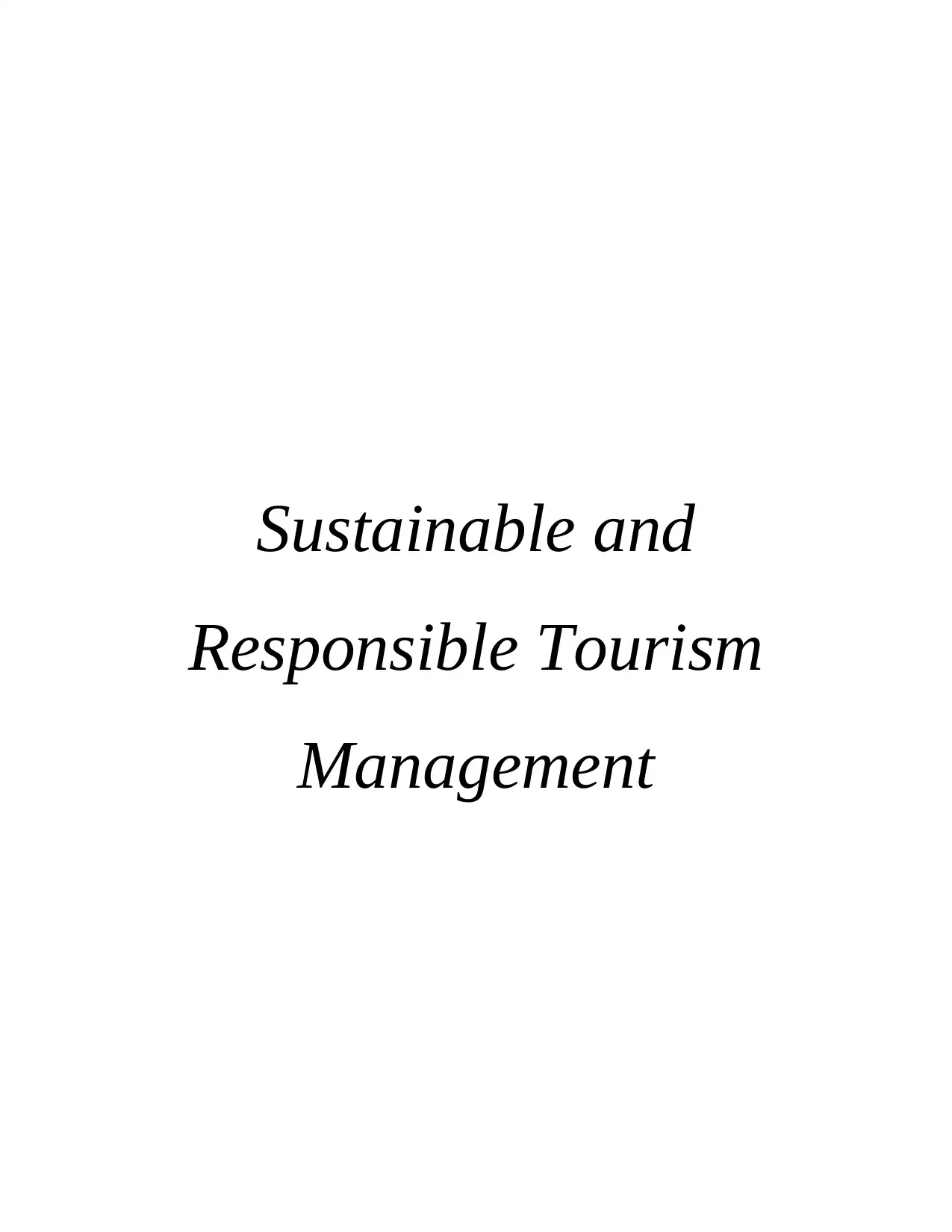
Sustainable and
Responsible Tourism
Management
Responsible Tourism
Management
Paraphrase This Document
Need a fresh take? Get an instant paraphrase of this document with our AI Paraphraser
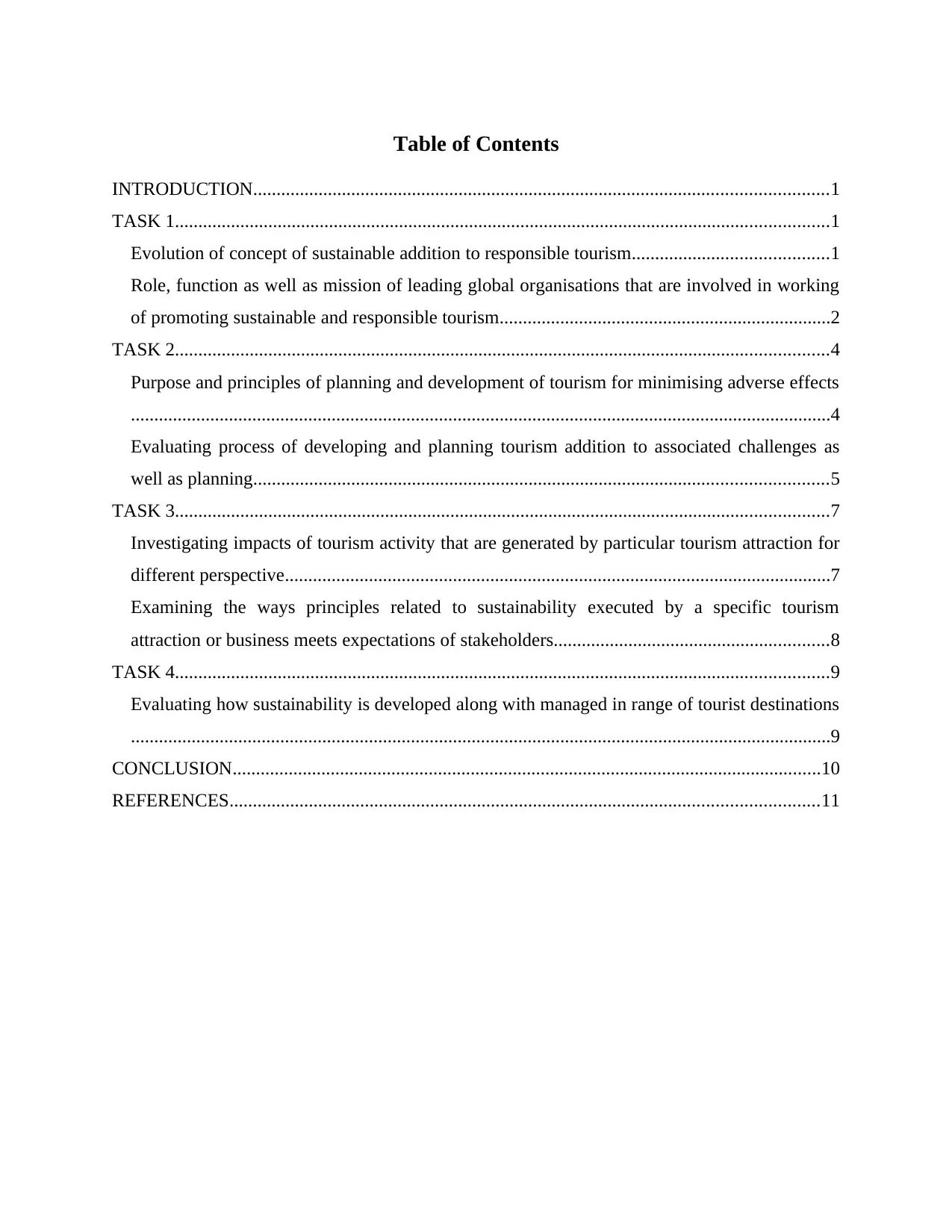
Table of Contents
INTRODUCTION...........................................................................................................................1
TASK 1............................................................................................................................................1
Evolution of concept of sustainable addition to responsible tourism..........................................1
Role, function as well as mission of leading global organisations that are involved in working
of promoting sustainable and responsible tourism.......................................................................2
TASK 2............................................................................................................................................4
Purpose and principles of planning and development of tourism for minimising adverse effects
......................................................................................................................................................4
Evaluating process of developing and planning tourism addition to associated challenges as
well as planning...........................................................................................................................5
TASK 3............................................................................................................................................7
Investigating impacts of tourism activity that are generated by particular tourism attraction for
different perspective.....................................................................................................................7
Examining the ways principles related to sustainability executed by a specific tourism
attraction or business meets expectations of stakeholders...........................................................8
TASK 4............................................................................................................................................9
Evaluating how sustainability is developed along with managed in range of tourist destinations
......................................................................................................................................................9
CONCLUSION..............................................................................................................................10
REFERENCES..............................................................................................................................11
INTRODUCTION...........................................................................................................................1
TASK 1............................................................................................................................................1
Evolution of concept of sustainable addition to responsible tourism..........................................1
Role, function as well as mission of leading global organisations that are involved in working
of promoting sustainable and responsible tourism.......................................................................2
TASK 2............................................................................................................................................4
Purpose and principles of planning and development of tourism for minimising adverse effects
......................................................................................................................................................4
Evaluating process of developing and planning tourism addition to associated challenges as
well as planning...........................................................................................................................5
TASK 3............................................................................................................................................7
Investigating impacts of tourism activity that are generated by particular tourism attraction for
different perspective.....................................................................................................................7
Examining the ways principles related to sustainability executed by a specific tourism
attraction or business meets expectations of stakeholders...........................................................8
TASK 4............................................................................................................................................9
Evaluating how sustainability is developed along with managed in range of tourist destinations
......................................................................................................................................................9
CONCLUSION..............................................................................................................................10
REFERENCES..............................................................................................................................11

⊘ This is a preview!⊘
Do you want full access?
Subscribe today to unlock all pages.

Trusted by 1+ million students worldwide
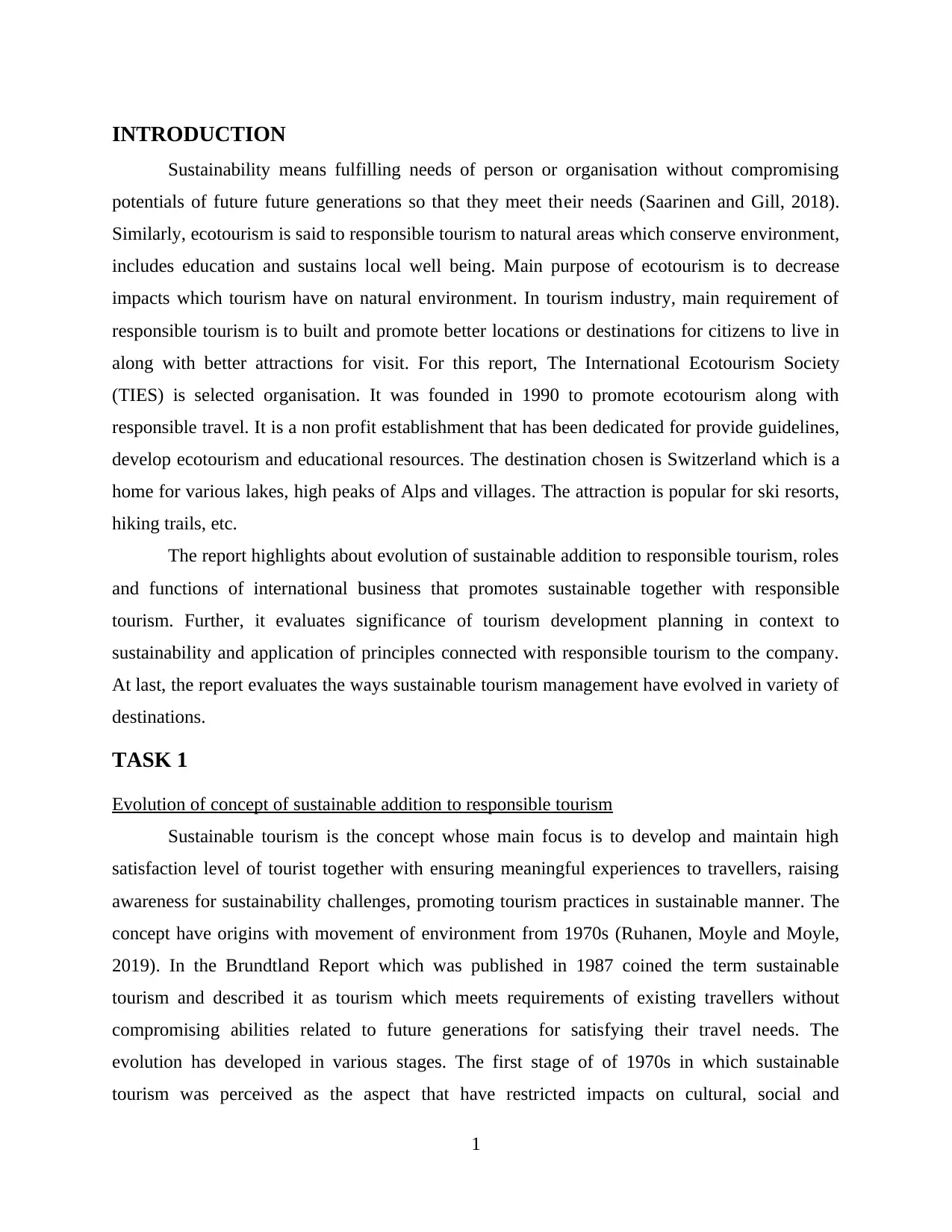
INTRODUCTION
Sustainability means fulfilling needs of person or organisation without compromising
potentials of future future generations so that they meet their needs (Saarinen and Gill, 2018).
Similarly, ecotourism is said to responsible tourism to natural areas which conserve environment,
includes education and sustains local well being. Main purpose of ecotourism is to decrease
impacts which tourism have on natural environment. In tourism industry, main requirement of
responsible tourism is to built and promote better locations or destinations for citizens to live in
along with better attractions for visit. For this report, The International Ecotourism Society
(TIES) is selected organisation. It was founded in 1990 to promote ecotourism along with
responsible travel. It is a non profit establishment that has been dedicated for provide guidelines,
develop ecotourism and educational resources. The destination chosen is Switzerland which is a
home for various lakes, high peaks of Alps and villages. The attraction is popular for ski resorts,
hiking trails, etc.
The report highlights about evolution of sustainable addition to responsible tourism, roles
and functions of international business that promotes sustainable together with responsible
tourism. Further, it evaluates significance of tourism development planning in context to
sustainability and application of principles connected with responsible tourism to the company.
At last, the report evaluates the ways sustainable tourism management have evolved in variety of
destinations.
TASK 1
Evolution of concept of sustainable addition to responsible tourism
Sustainable tourism is the concept whose main focus is to develop and maintain high
satisfaction level of tourist together with ensuring meaningful experiences to travellers, raising
awareness for sustainability challenges, promoting tourism practices in sustainable manner. The
concept have origins with movement of environment from 1970s (Ruhanen, Moyle and Moyle,
2019). In the Brundtland Report which was published in 1987 coined the term sustainable
tourism and described it as tourism which meets requirements of existing travellers without
compromising abilities related to future generations for satisfying their travel needs. The
evolution has developed in various stages. The first stage of of 1970s in which sustainable
tourism was perceived as the aspect that have restricted impacts on cultural, social and
1
Sustainability means fulfilling needs of person or organisation without compromising
potentials of future future generations so that they meet their needs (Saarinen and Gill, 2018).
Similarly, ecotourism is said to responsible tourism to natural areas which conserve environment,
includes education and sustains local well being. Main purpose of ecotourism is to decrease
impacts which tourism have on natural environment. In tourism industry, main requirement of
responsible tourism is to built and promote better locations or destinations for citizens to live in
along with better attractions for visit. For this report, The International Ecotourism Society
(TIES) is selected organisation. It was founded in 1990 to promote ecotourism along with
responsible travel. It is a non profit establishment that has been dedicated for provide guidelines,
develop ecotourism and educational resources. The destination chosen is Switzerland which is a
home for various lakes, high peaks of Alps and villages. The attraction is popular for ski resorts,
hiking trails, etc.
The report highlights about evolution of sustainable addition to responsible tourism, roles
and functions of international business that promotes sustainable together with responsible
tourism. Further, it evaluates significance of tourism development planning in context to
sustainability and application of principles connected with responsible tourism to the company.
At last, the report evaluates the ways sustainable tourism management have evolved in variety of
destinations.
TASK 1
Evolution of concept of sustainable addition to responsible tourism
Sustainable tourism is the concept whose main focus is to develop and maintain high
satisfaction level of tourist together with ensuring meaningful experiences to travellers, raising
awareness for sustainability challenges, promoting tourism practices in sustainable manner. The
concept have origins with movement of environment from 1970s (Ruhanen, Moyle and Moyle,
2019). In the Brundtland Report which was published in 1987 coined the term sustainable
tourism and described it as tourism which meets requirements of existing travellers without
compromising abilities related to future generations for satisfying their travel needs. The
evolution has developed in various stages. The first stage of of 1970s in which sustainable
tourism was perceived as the aspect that have restricted impacts on cultural, social and
1
Paraphrase This Document
Need a fresh take? Get an instant paraphrase of this document with our AI Paraphraser
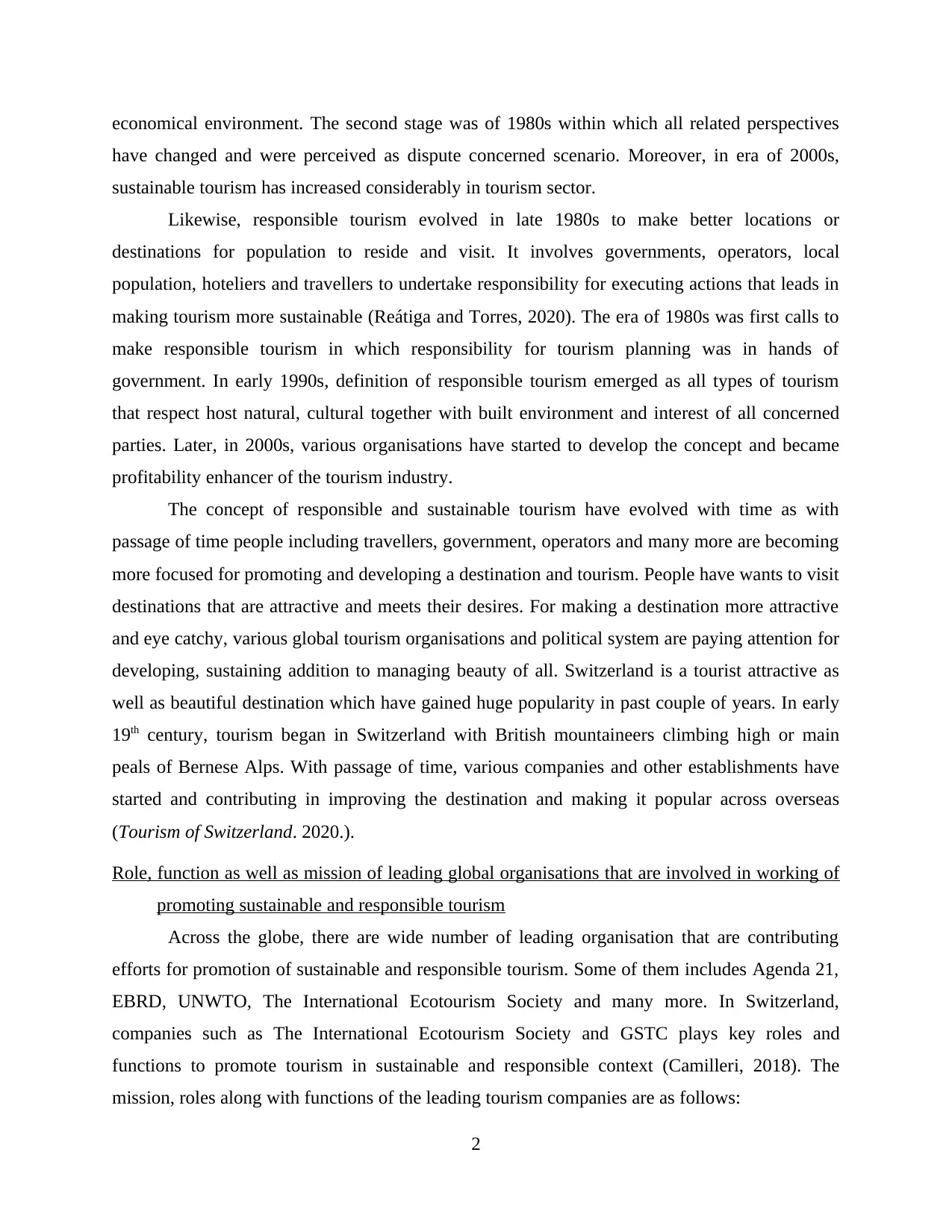
economical environment. The second stage was of 1980s within which all related perspectives
have changed and were perceived as dispute concerned scenario. Moreover, in era of 2000s,
sustainable tourism has increased considerably in tourism sector.
Likewise, responsible tourism evolved in late 1980s to make better locations or
destinations for population to reside and visit. It involves governments, operators, local
population, hoteliers and travellers to undertake responsibility for executing actions that leads in
making tourism more sustainable (Reátiga and Torres, 2020). The era of 1980s was first calls to
make responsible tourism in which responsibility for tourism planning was in hands of
government. In early 1990s, definition of responsible tourism emerged as all types of tourism
that respect host natural, cultural together with built environment and interest of all concerned
parties. Later, in 2000s, various organisations have started to develop the concept and became
profitability enhancer of the tourism industry.
The concept of responsible and sustainable tourism have evolved with time as with
passage of time people including travellers, government, operators and many more are becoming
more focused for promoting and developing a destination and tourism. People have wants to visit
destinations that are attractive and meets their desires. For making a destination more attractive
and eye catchy, various global tourism organisations and political system are paying attention for
developing, sustaining addition to managing beauty of all. Switzerland is a tourist attractive as
well as beautiful destination which have gained huge popularity in past couple of years. In early
19th century, tourism began in Switzerland with British mountaineers climbing high or main
peals of Bernese Alps. With passage of time, various companies and other establishments have
started and contributing in improving the destination and making it popular across overseas
(Tourism of Switzerland. 2020.).
Role, function as well as mission of leading global organisations that are involved in working of
promoting sustainable and responsible tourism
Across the globe, there are wide number of leading organisation that are contributing
efforts for promotion of sustainable and responsible tourism. Some of them includes Agenda 21,
EBRD, UNWTO, The International Ecotourism Society and many more. In Switzerland,
companies such as The International Ecotourism Society and GSTC plays key roles and
functions to promote tourism in sustainable and responsible context (Camilleri, 2018). The
mission, roles along with functions of the leading tourism companies are as follows:
2
have changed and were perceived as dispute concerned scenario. Moreover, in era of 2000s,
sustainable tourism has increased considerably in tourism sector.
Likewise, responsible tourism evolved in late 1980s to make better locations or
destinations for population to reside and visit. It involves governments, operators, local
population, hoteliers and travellers to undertake responsibility for executing actions that leads in
making tourism more sustainable (Reátiga and Torres, 2020). The era of 1980s was first calls to
make responsible tourism in which responsibility for tourism planning was in hands of
government. In early 1990s, definition of responsible tourism emerged as all types of tourism
that respect host natural, cultural together with built environment and interest of all concerned
parties. Later, in 2000s, various organisations have started to develop the concept and became
profitability enhancer of the tourism industry.
The concept of responsible and sustainable tourism have evolved with time as with
passage of time people including travellers, government, operators and many more are becoming
more focused for promoting and developing a destination and tourism. People have wants to visit
destinations that are attractive and meets their desires. For making a destination more attractive
and eye catchy, various global tourism organisations and political system are paying attention for
developing, sustaining addition to managing beauty of all. Switzerland is a tourist attractive as
well as beautiful destination which have gained huge popularity in past couple of years. In early
19th century, tourism began in Switzerland with British mountaineers climbing high or main
peals of Bernese Alps. With passage of time, various companies and other establishments have
started and contributing in improving the destination and making it popular across overseas
(Tourism of Switzerland. 2020.).
Role, function as well as mission of leading global organisations that are involved in working of
promoting sustainable and responsible tourism
Across the globe, there are wide number of leading organisation that are contributing
efforts for promotion of sustainable and responsible tourism. Some of them includes Agenda 21,
EBRD, UNWTO, The International Ecotourism Society and many more. In Switzerland,
companies such as The International Ecotourism Society and GSTC plays key roles and
functions to promote tourism in sustainable and responsible context (Camilleri, 2018). The
mission, roles along with functions of the leading tourism companies are as follows:
2
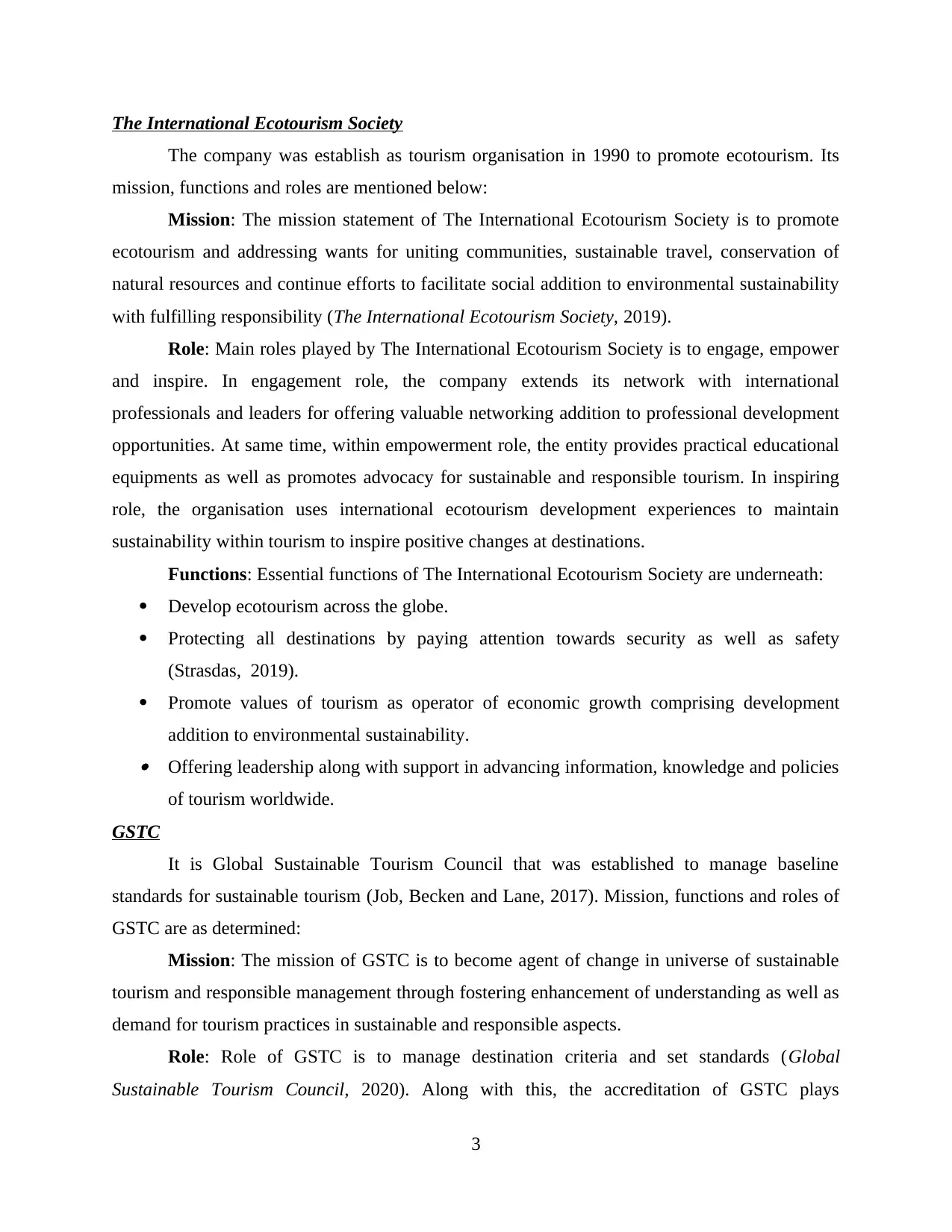
The International Ecotourism Society
The company was establish as tourism organisation in 1990 to promote ecotourism. Its
mission, functions and roles are mentioned below:
Mission: The mission statement of The International Ecotourism Society is to promote
ecotourism and addressing wants for uniting communities, sustainable travel, conservation of
natural resources and continue efforts to facilitate social addition to environmental sustainability
with fulfilling responsibility (The International Ecotourism Society, 2019).
Role: Main roles played by The International Ecotourism Society is to engage, empower
and inspire. In engagement role, the company extends its network with international
professionals and leaders for offering valuable networking addition to professional development
opportunities. At same time, within empowerment role, the entity provides practical educational
equipments as well as promotes advocacy for sustainable and responsible tourism. In inspiring
role, the organisation uses international ecotourism development experiences to maintain
sustainability within tourism to inspire positive changes at destinations.
Functions: Essential functions of The International Ecotourism Society are underneath:
Develop ecotourism across the globe.
Protecting all destinations by paying attention towards security as well as safety
(Strasdas, 2019).
Promote values of tourism as operator of economic growth comprising development
addition to environmental sustainability. Offering leadership along with support in advancing information, knowledge and policies
of tourism worldwide.
GSTC
It is Global Sustainable Tourism Council that was established to manage baseline
standards for sustainable tourism (Job, Becken and Lane, 2017). Mission, functions and roles of
GSTC are as determined:
Mission: The mission of GSTC is to become agent of change in universe of sustainable
tourism and responsible management through fostering enhancement of understanding as well as
demand for tourism practices in sustainable and responsible aspects.
Role: Role of GSTC is to manage destination criteria and set standards (Global
Sustainable Tourism Council, 2020). Along with this, the accreditation of GSTC plays
3
The company was establish as tourism organisation in 1990 to promote ecotourism. Its
mission, functions and roles are mentioned below:
Mission: The mission statement of The International Ecotourism Society is to promote
ecotourism and addressing wants for uniting communities, sustainable travel, conservation of
natural resources and continue efforts to facilitate social addition to environmental sustainability
with fulfilling responsibility (The International Ecotourism Society, 2019).
Role: Main roles played by The International Ecotourism Society is to engage, empower
and inspire. In engagement role, the company extends its network with international
professionals and leaders for offering valuable networking addition to professional development
opportunities. At same time, within empowerment role, the entity provides practical educational
equipments as well as promotes advocacy for sustainable and responsible tourism. In inspiring
role, the organisation uses international ecotourism development experiences to maintain
sustainability within tourism to inspire positive changes at destinations.
Functions: Essential functions of The International Ecotourism Society are underneath:
Develop ecotourism across the globe.
Protecting all destinations by paying attention towards security as well as safety
(Strasdas, 2019).
Promote values of tourism as operator of economic growth comprising development
addition to environmental sustainability. Offering leadership along with support in advancing information, knowledge and policies
of tourism worldwide.
GSTC
It is Global Sustainable Tourism Council that was established to manage baseline
standards for sustainable tourism (Job, Becken and Lane, 2017). Mission, functions and roles of
GSTC are as determined:
Mission: The mission of GSTC is to become agent of change in universe of sustainable
tourism and responsible management through fostering enhancement of understanding as well as
demand for tourism practices in sustainable and responsible aspects.
Role: Role of GSTC is to manage destination criteria and set standards (Global
Sustainable Tourism Council, 2020). Along with this, the accreditation of GSTC plays
3
⊘ This is a preview!⊘
Do you want full access?
Subscribe today to unlock all pages.

Trusted by 1+ million students worldwide
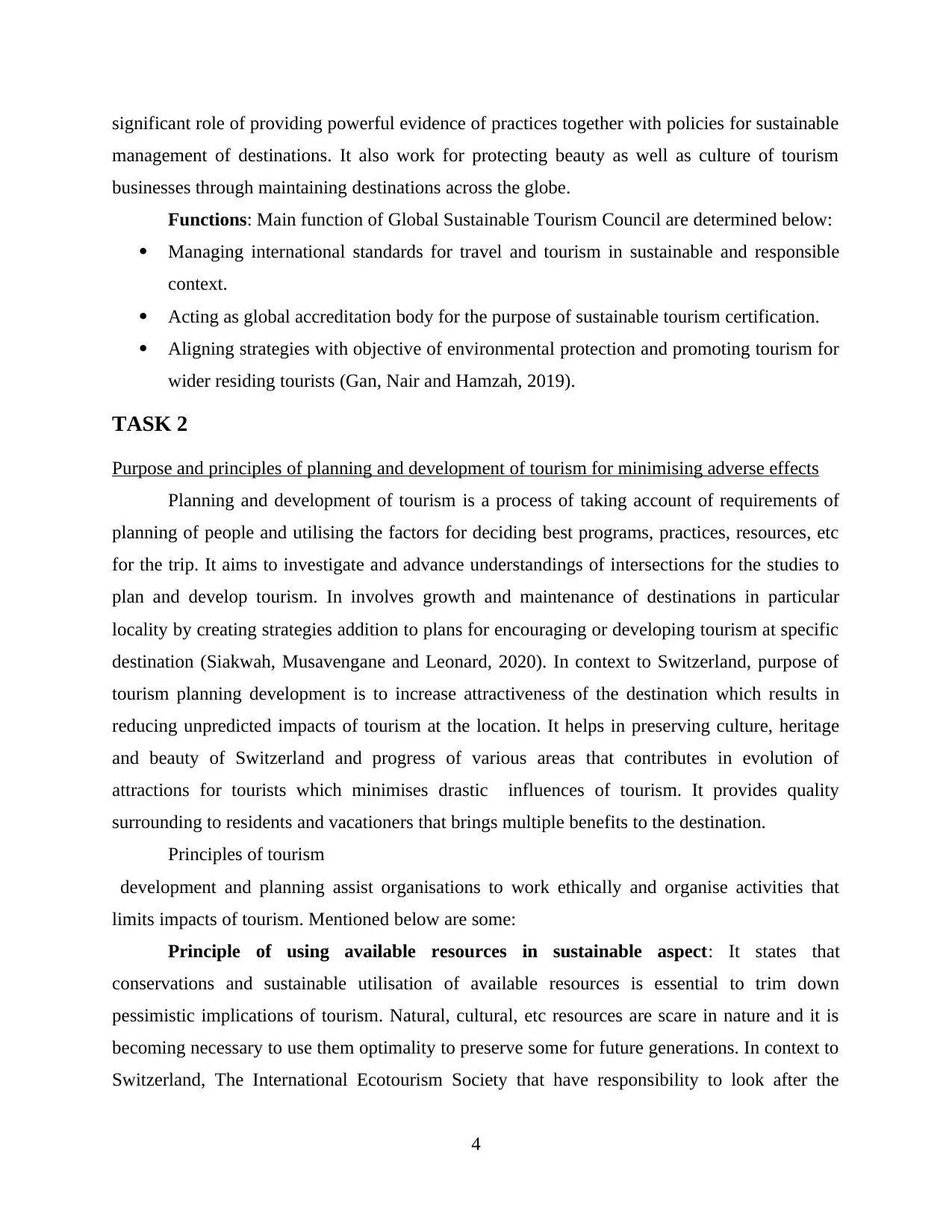
significant role of providing powerful evidence of practices together with policies for sustainable
management of destinations. It also work for protecting beauty as well as culture of tourism
businesses through maintaining destinations across the globe.
Functions: Main function of Global Sustainable Tourism Council are determined below:
Managing international standards for travel and tourism in sustainable and responsible
context.
Acting as global accreditation body for the purpose of sustainable tourism certification.
Aligning strategies with objective of environmental protection and promoting tourism for
wider residing tourists (Gan, Nair and Hamzah, 2019).
TASK 2
Purpose and principles of planning and development of tourism for minimising adverse effects
Planning and development of tourism is a process of taking account of requirements of
planning of people and utilising the factors for deciding best programs, practices, resources, etc
for the trip. It aims to investigate and advance understandings of intersections for the studies to
plan and develop tourism. In involves growth and maintenance of destinations in particular
locality by creating strategies addition to plans for encouraging or developing tourism at specific
destination (Siakwah, Musavengane and Leonard, 2020). In context to Switzerland, purpose of
tourism planning development is to increase attractiveness of the destination which results in
reducing unpredicted impacts of tourism at the location. It helps in preserving culture, heritage
and beauty of Switzerland and progress of various areas that contributes in evolution of
attractions for tourists which minimises drastic influences of tourism. It provides quality
surrounding to residents and vacationers that brings multiple benefits to the destination.
Principles of tourism
development and planning assist organisations to work ethically and organise activities that
limits impacts of tourism. Mentioned below are some:
Principle of using available resources in sustainable aspect: It states that
conservations and sustainable utilisation of available resources is essential to trim down
pessimistic implications of tourism. Natural, cultural, etc resources are scare in nature and it is
becoming necessary to use them optimality to preserve some for future generations. In context to
Switzerland, The International Ecotourism Society that have responsibility to look after the
4
management of destinations. It also work for protecting beauty as well as culture of tourism
businesses through maintaining destinations across the globe.
Functions: Main function of Global Sustainable Tourism Council are determined below:
Managing international standards for travel and tourism in sustainable and responsible
context.
Acting as global accreditation body for the purpose of sustainable tourism certification.
Aligning strategies with objective of environmental protection and promoting tourism for
wider residing tourists (Gan, Nair and Hamzah, 2019).
TASK 2
Purpose and principles of planning and development of tourism for minimising adverse effects
Planning and development of tourism is a process of taking account of requirements of
planning of people and utilising the factors for deciding best programs, practices, resources, etc
for the trip. It aims to investigate and advance understandings of intersections for the studies to
plan and develop tourism. In involves growth and maintenance of destinations in particular
locality by creating strategies addition to plans for encouraging or developing tourism at specific
destination (Siakwah, Musavengane and Leonard, 2020). In context to Switzerland, purpose of
tourism planning development is to increase attractiveness of the destination which results in
reducing unpredicted impacts of tourism at the location. It helps in preserving culture, heritage
and beauty of Switzerland and progress of various areas that contributes in evolution of
attractions for tourists which minimises drastic influences of tourism. It provides quality
surrounding to residents and vacationers that brings multiple benefits to the destination.
Principles of tourism
development and planning assist organisations to work ethically and organise activities that
limits impacts of tourism. Mentioned below are some:
Principle of using available resources in sustainable aspect: It states that
conservations and sustainable utilisation of available resources is essential to trim down
pessimistic implications of tourism. Natural, cultural, etc resources are scare in nature and it is
becoming necessary to use them optimality to preserve some for future generations. In context to
Switzerland, The International Ecotourism Society that have responsibility to look after the
4
Paraphrase This Document
Need a fresh take? Get an instant paraphrase of this document with our AI Paraphraser
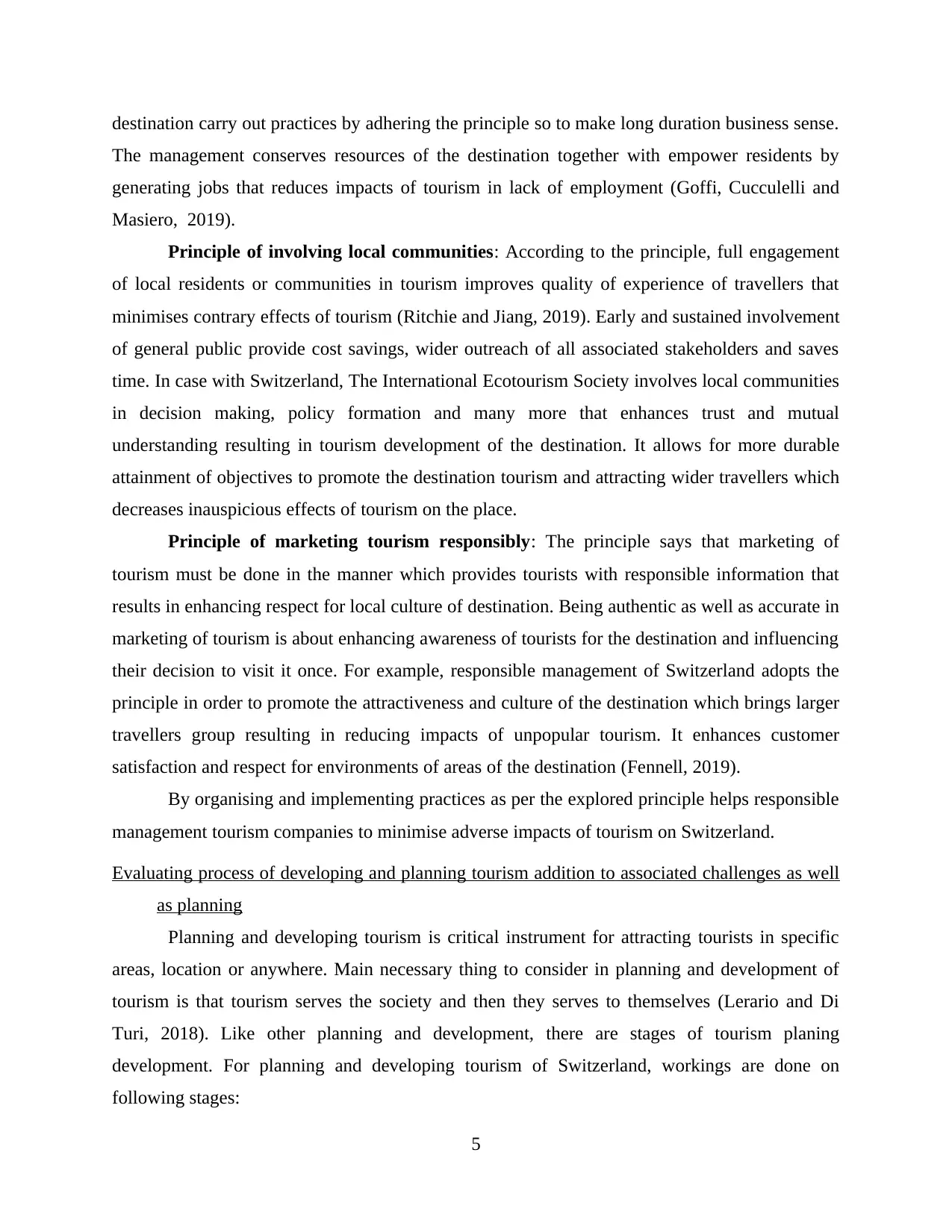
destination carry out practices by adhering the principle so to make long duration business sense.
The management conserves resources of the destination together with empower residents by
generating jobs that reduces impacts of tourism in lack of employment (Goffi, Cucculelli and
Masiero, 2019).
Principle of involving local communities: According to the principle, full engagement
of local residents or communities in tourism improves quality of experience of travellers that
minimises contrary effects of tourism (Ritchie and Jiang, 2019). Early and sustained involvement
of general public provide cost savings, wider outreach of all associated stakeholders and saves
time. In case with Switzerland, The International Ecotourism Society involves local communities
in decision making, policy formation and many more that enhances trust and mutual
understanding resulting in tourism development of the destination. It allows for more durable
attainment of objectives to promote the destination tourism and attracting wider travellers which
decreases inauspicious effects of tourism on the place.
Principle of marketing tourism responsibly: The principle says that marketing of
tourism must be done in the manner which provides tourists with responsible information that
results in enhancing respect for local culture of destination. Being authentic as well as accurate in
marketing of tourism is about enhancing awareness of tourists for the destination and influencing
their decision to visit it once. For example, responsible management of Switzerland adopts the
principle in order to promote the attractiveness and culture of the destination which brings larger
travellers group resulting in reducing impacts of unpopular tourism. It enhances customer
satisfaction and respect for environments of areas of the destination (Fennell, 2019).
By organising and implementing practices as per the explored principle helps responsible
management tourism companies to minimise adverse impacts of tourism on Switzerland.
Evaluating process of developing and planning tourism addition to associated challenges as well
as planning
Planning and developing tourism is critical instrument for attracting tourists in specific
areas, location or anywhere. Main necessary thing to consider in planning and development of
tourism is that tourism serves the society and then they serves to themselves (Lerario and Di
Turi, 2018). Like other planning and development, there are stages of tourism planing
development. For planning and developing tourism of Switzerland, workings are done on
following stages:
5
The management conserves resources of the destination together with empower residents by
generating jobs that reduces impacts of tourism in lack of employment (Goffi, Cucculelli and
Masiero, 2019).
Principle of involving local communities: According to the principle, full engagement
of local residents or communities in tourism improves quality of experience of travellers that
minimises contrary effects of tourism (Ritchie and Jiang, 2019). Early and sustained involvement
of general public provide cost savings, wider outreach of all associated stakeholders and saves
time. In case with Switzerland, The International Ecotourism Society involves local communities
in decision making, policy formation and many more that enhances trust and mutual
understanding resulting in tourism development of the destination. It allows for more durable
attainment of objectives to promote the destination tourism and attracting wider travellers which
decreases inauspicious effects of tourism on the place.
Principle of marketing tourism responsibly: The principle says that marketing of
tourism must be done in the manner which provides tourists with responsible information that
results in enhancing respect for local culture of destination. Being authentic as well as accurate in
marketing of tourism is about enhancing awareness of tourists for the destination and influencing
their decision to visit it once. For example, responsible management of Switzerland adopts the
principle in order to promote the attractiveness and culture of the destination which brings larger
travellers group resulting in reducing impacts of unpopular tourism. It enhances customer
satisfaction and respect for environments of areas of the destination (Fennell, 2019).
By organising and implementing practices as per the explored principle helps responsible
management tourism companies to minimise adverse impacts of tourism on Switzerland.
Evaluating process of developing and planning tourism addition to associated challenges as well
as planning
Planning and developing tourism is critical instrument for attracting tourists in specific
areas, location or anywhere. Main necessary thing to consider in planning and development of
tourism is that tourism serves the society and then they serves to themselves (Lerario and Di
Turi, 2018). Like other planning and development, there are stages of tourism planing
development. For planning and developing tourism of Switzerland, workings are done on
following stages:
5
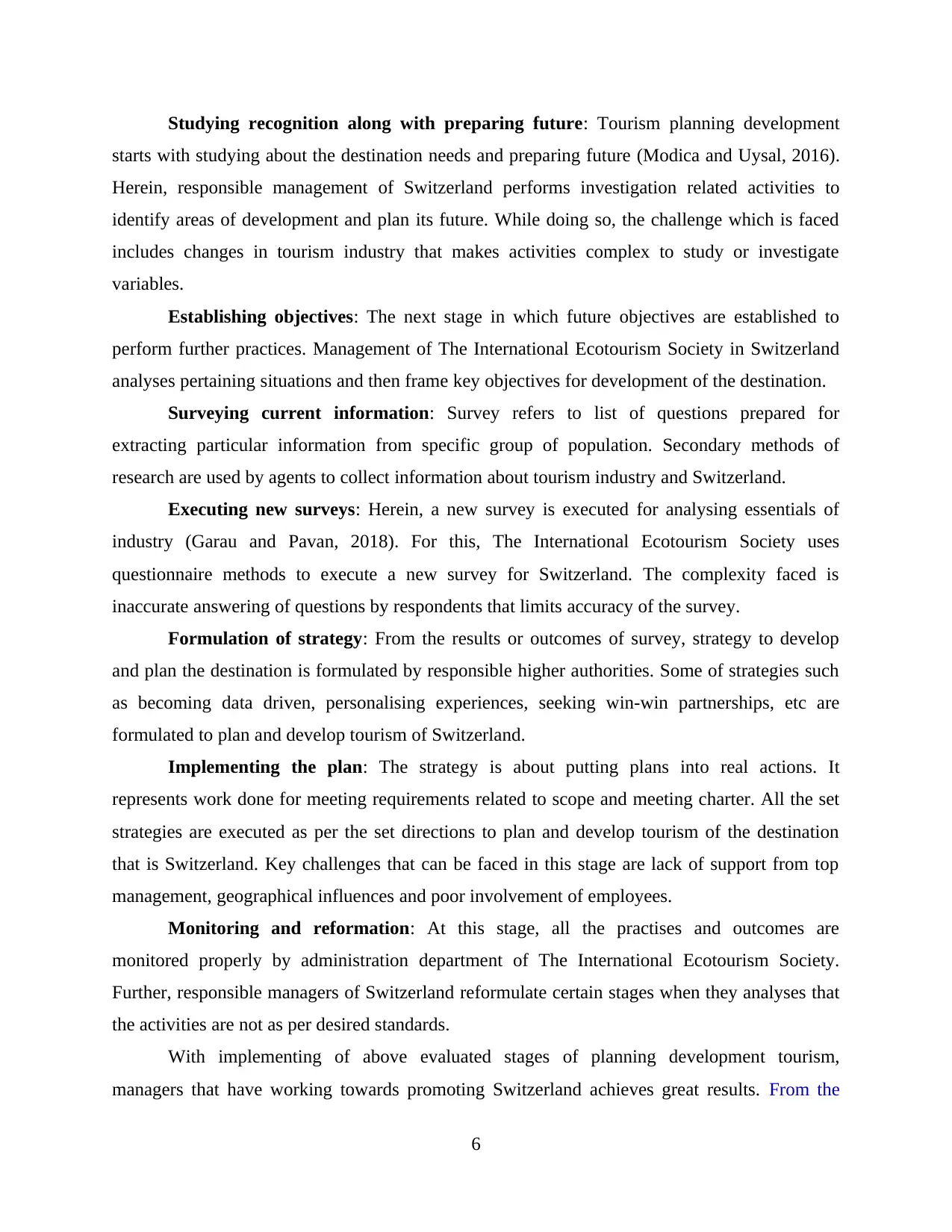
Studying recognition along with preparing future: Tourism planning development
starts with studying about the destination needs and preparing future (Modica and Uysal, 2016).
Herein, responsible management of Switzerland performs investigation related activities to
identify areas of development and plan its future. While doing so, the challenge which is faced
includes changes in tourism industry that makes activities complex to study or investigate
variables.
Establishing objectives: The next stage in which future objectives are established to
perform further practices. Management of The International Ecotourism Society in Switzerland
analyses pertaining situations and then frame key objectives for development of the destination.
Surveying current information: Survey refers to list of questions prepared for
extracting particular information from specific group of population. Secondary methods of
research are used by agents to collect information about tourism industry and Switzerland.
Executing new surveys: Herein, a new survey is executed for analysing essentials of
industry (Garau and Pavan, 2018). For this, The International Ecotourism Society uses
questionnaire methods to execute a new survey for Switzerland. The complexity faced is
inaccurate answering of questions by respondents that limits accuracy of the survey.
Formulation of strategy: From the results or outcomes of survey, strategy to develop
and plan the destination is formulated by responsible higher authorities. Some of strategies such
as becoming data driven, personalising experiences, seeking win-win partnerships, etc are
formulated to plan and develop tourism of Switzerland.
Implementing the plan: The strategy is about putting plans into real actions. It
represents work done for meeting requirements related to scope and meeting charter. All the set
strategies are executed as per the set directions to plan and develop tourism of the destination
that is Switzerland. Key challenges that can be faced in this stage are lack of support from top
management, geographical influences and poor involvement of employees.
Monitoring and reformation: At this stage, all the practises and outcomes are
monitored properly by administration department of The International Ecotourism Society.
Further, responsible managers of Switzerland reformulate certain stages when they analyses that
the activities are not as per desired standards.
With implementing of above evaluated stages of planning development tourism,
managers that have working towards promoting Switzerland achieves great results. From the
6
starts with studying about the destination needs and preparing future (Modica and Uysal, 2016).
Herein, responsible management of Switzerland performs investigation related activities to
identify areas of development and plan its future. While doing so, the challenge which is faced
includes changes in tourism industry that makes activities complex to study or investigate
variables.
Establishing objectives: The next stage in which future objectives are established to
perform further practices. Management of The International Ecotourism Society in Switzerland
analyses pertaining situations and then frame key objectives for development of the destination.
Surveying current information: Survey refers to list of questions prepared for
extracting particular information from specific group of population. Secondary methods of
research are used by agents to collect information about tourism industry and Switzerland.
Executing new surveys: Herein, a new survey is executed for analysing essentials of
industry (Garau and Pavan, 2018). For this, The International Ecotourism Society uses
questionnaire methods to execute a new survey for Switzerland. The complexity faced is
inaccurate answering of questions by respondents that limits accuracy of the survey.
Formulation of strategy: From the results or outcomes of survey, strategy to develop
and plan the destination is formulated by responsible higher authorities. Some of strategies such
as becoming data driven, personalising experiences, seeking win-win partnerships, etc are
formulated to plan and develop tourism of Switzerland.
Implementing the plan: The strategy is about putting plans into real actions. It
represents work done for meeting requirements related to scope and meeting charter. All the set
strategies are executed as per the set directions to plan and develop tourism of the destination
that is Switzerland. Key challenges that can be faced in this stage are lack of support from top
management, geographical influences and poor involvement of employees.
Monitoring and reformation: At this stage, all the practises and outcomes are
monitored properly by administration department of The International Ecotourism Society.
Further, responsible managers of Switzerland reformulate certain stages when they analyses that
the activities are not as per desired standards.
With implementing of above evaluated stages of planning development tourism,
managers that have working towards promoting Switzerland achieves great results. From the
6
⊘ This is a preview!⊘
Do you want full access?
Subscribe today to unlock all pages.

Trusted by 1+ million students worldwide
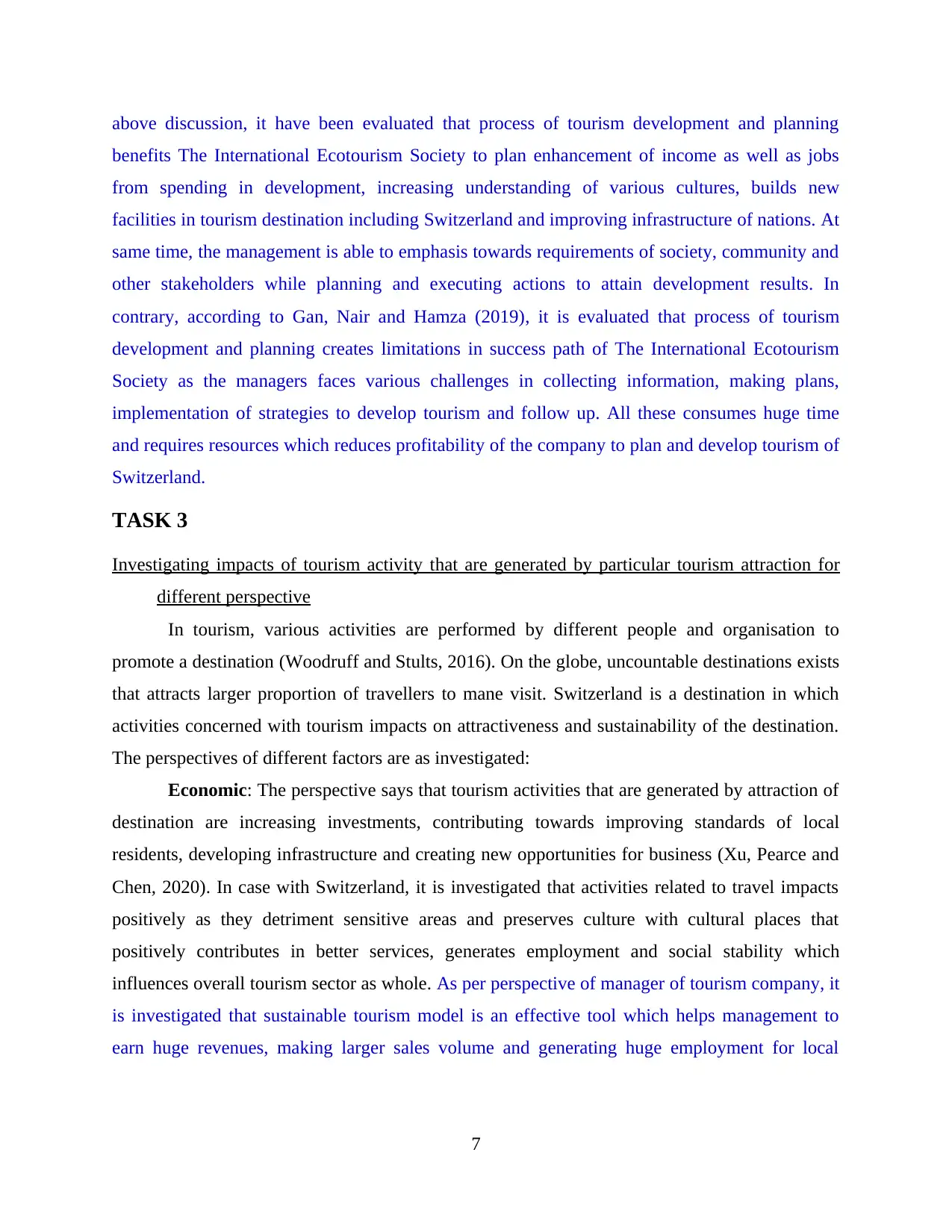
above discussion, it have been evaluated that process of tourism development and planning
benefits The International Ecotourism Society to plan enhancement of income as well as jobs
from spending in development, increasing understanding of various cultures, builds new
facilities in tourism destination including Switzerland and improving infrastructure of nations. At
same time, the management is able to emphasis towards requirements of society, community and
other stakeholders while planning and executing actions to attain development results. In
contrary, according to Gan, Nair and Hamza (2019), it is evaluated that process of tourism
development and planning creates limitations in success path of The International Ecotourism
Society as the managers faces various challenges in collecting information, making plans,
implementation of strategies to develop tourism and follow up. All these consumes huge time
and requires resources which reduces profitability of the company to plan and develop tourism of
Switzerland.
TASK 3
Investigating impacts of tourism activity that are generated by particular tourism attraction for
different perspective
In tourism, various activities are performed by different people and organisation to
promote a destination (Woodruff and Stults, 2016). On the globe, uncountable destinations exists
that attracts larger proportion of travellers to mane visit. Switzerland is a destination in which
activities concerned with tourism impacts on attractiveness and sustainability of the destination.
The perspectives of different factors are as investigated:
Economic: The perspective says that tourism activities that are generated by attraction of
destination are increasing investments, contributing towards improving standards of local
residents, developing infrastructure and creating new opportunities for business (Xu, Pearce and
Chen, 2020). In case with Switzerland, it is investigated that activities related to travel impacts
positively as they detriment sensitive areas and preserves culture with cultural places that
positively contributes in better services, generates employment and social stability which
influences overall tourism sector as whole. As per perspective of manager of tourism company, it
is investigated that sustainable tourism model is an effective tool which helps management to
earn huge revenues, making larger sales volume and generating huge employment for local
7
benefits The International Ecotourism Society to plan enhancement of income as well as jobs
from spending in development, increasing understanding of various cultures, builds new
facilities in tourism destination including Switzerland and improving infrastructure of nations. At
same time, the management is able to emphasis towards requirements of society, community and
other stakeholders while planning and executing actions to attain development results. In
contrary, according to Gan, Nair and Hamza (2019), it is evaluated that process of tourism
development and planning creates limitations in success path of The International Ecotourism
Society as the managers faces various challenges in collecting information, making plans,
implementation of strategies to develop tourism and follow up. All these consumes huge time
and requires resources which reduces profitability of the company to plan and develop tourism of
Switzerland.
TASK 3
Investigating impacts of tourism activity that are generated by particular tourism attraction for
different perspective
In tourism, various activities are performed by different people and organisation to
promote a destination (Woodruff and Stults, 2016). On the globe, uncountable destinations exists
that attracts larger proportion of travellers to mane visit. Switzerland is a destination in which
activities concerned with tourism impacts on attractiveness and sustainability of the destination.
The perspectives of different factors are as investigated:
Economic: The perspective says that tourism activities that are generated by attraction of
destination are increasing investments, contributing towards improving standards of local
residents, developing infrastructure and creating new opportunities for business (Xu, Pearce and
Chen, 2020). In case with Switzerland, it is investigated that activities related to travel impacts
positively as they detriment sensitive areas and preserves culture with cultural places that
positively contributes in better services, generates employment and social stability which
influences overall tourism sector as whole. As per perspective of manager of tourism company, it
is investigated that sustainable tourism model is an effective tool which helps management to
earn huge revenues, making larger sales volume and generating huge employment for local
7
Paraphrase This Document
Need a fresh take? Get an instant paraphrase of this document with our AI Paraphraser
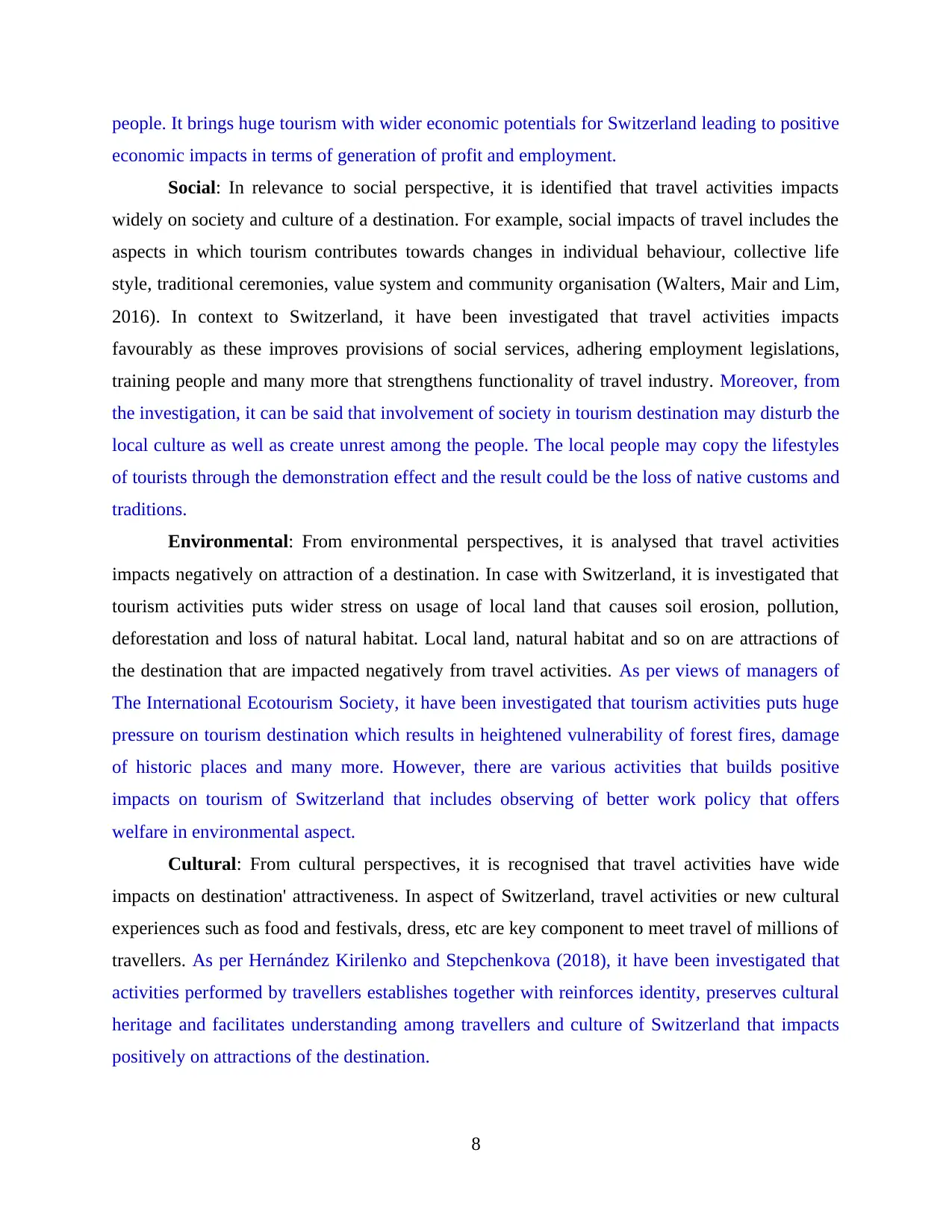
people. It brings huge tourism with wider economic potentials for Switzerland leading to positive
economic impacts in terms of generation of profit and employment.
Social: In relevance to social perspective, it is identified that travel activities impacts
widely on society and culture of a destination. For example, social impacts of travel includes the
aspects in which tourism contributes towards changes in individual behaviour, collective life
style, traditional ceremonies, value system and community organisation (Walters, Mair and Lim,
2016). In context to Switzerland, it have been investigated that travel activities impacts
favourably as these improves provisions of social services, adhering employment legislations,
training people and many more that strengthens functionality of travel industry. Moreover, from
the investigation, it can be said that involvement of society in tourism destination may disturb the
local culture as well as create unrest among the people. The local people may copy the lifestyles
of tourists through the demonstration effect and the result could be the loss of native customs and
traditions.
Environmental: From environmental perspectives, it is analysed that travel activities
impacts negatively on attraction of a destination. In case with Switzerland, it is investigated that
tourism activities puts wider stress on usage of local land that causes soil erosion, pollution,
deforestation and loss of natural habitat. Local land, natural habitat and so on are attractions of
the destination that are impacted negatively from travel activities. As per views of managers of
The International Ecotourism Society, it have been investigated that tourism activities puts huge
pressure on tourism destination which results in heightened vulnerability of forest fires, damage
of historic places and many more. However, there are various activities that builds positive
impacts on tourism of Switzerland that includes observing of better work policy that offers
welfare in environmental aspect.
Cultural: From cultural perspectives, it is recognised that travel activities have wide
impacts on destination' attractiveness. In aspect of Switzerland, travel activities or new cultural
experiences such as food and festivals, dress, etc are key component to meet travel of millions of
travellers. As per Hernández Kirilenko and Stepchenkova (2018), it have been investigated that
activities performed by travellers establishes together with reinforces identity, preserves cultural
heritage and facilitates understanding among travellers and culture of Switzerland that impacts
positively on attractions of the destination.
8
economic impacts in terms of generation of profit and employment.
Social: In relevance to social perspective, it is identified that travel activities impacts
widely on society and culture of a destination. For example, social impacts of travel includes the
aspects in which tourism contributes towards changes in individual behaviour, collective life
style, traditional ceremonies, value system and community organisation (Walters, Mair and Lim,
2016). In context to Switzerland, it have been investigated that travel activities impacts
favourably as these improves provisions of social services, adhering employment legislations,
training people and many more that strengthens functionality of travel industry. Moreover, from
the investigation, it can be said that involvement of society in tourism destination may disturb the
local culture as well as create unrest among the people. The local people may copy the lifestyles
of tourists through the demonstration effect and the result could be the loss of native customs and
traditions.
Environmental: From environmental perspectives, it is analysed that travel activities
impacts negatively on attraction of a destination. In case with Switzerland, it is investigated that
tourism activities puts wider stress on usage of local land that causes soil erosion, pollution,
deforestation and loss of natural habitat. Local land, natural habitat and so on are attractions of
the destination that are impacted negatively from travel activities. As per views of managers of
The International Ecotourism Society, it have been investigated that tourism activities puts huge
pressure on tourism destination which results in heightened vulnerability of forest fires, damage
of historic places and many more. However, there are various activities that builds positive
impacts on tourism of Switzerland that includes observing of better work policy that offers
welfare in environmental aspect.
Cultural: From cultural perspectives, it is recognised that travel activities have wide
impacts on destination' attractiveness. In aspect of Switzerland, travel activities or new cultural
experiences such as food and festivals, dress, etc are key component to meet travel of millions of
travellers. As per Hernández Kirilenko and Stepchenkova (2018), it have been investigated that
activities performed by travellers establishes together with reinforces identity, preserves cultural
heritage and facilitates understanding among travellers and culture of Switzerland that impacts
positively on attractions of the destination.
8
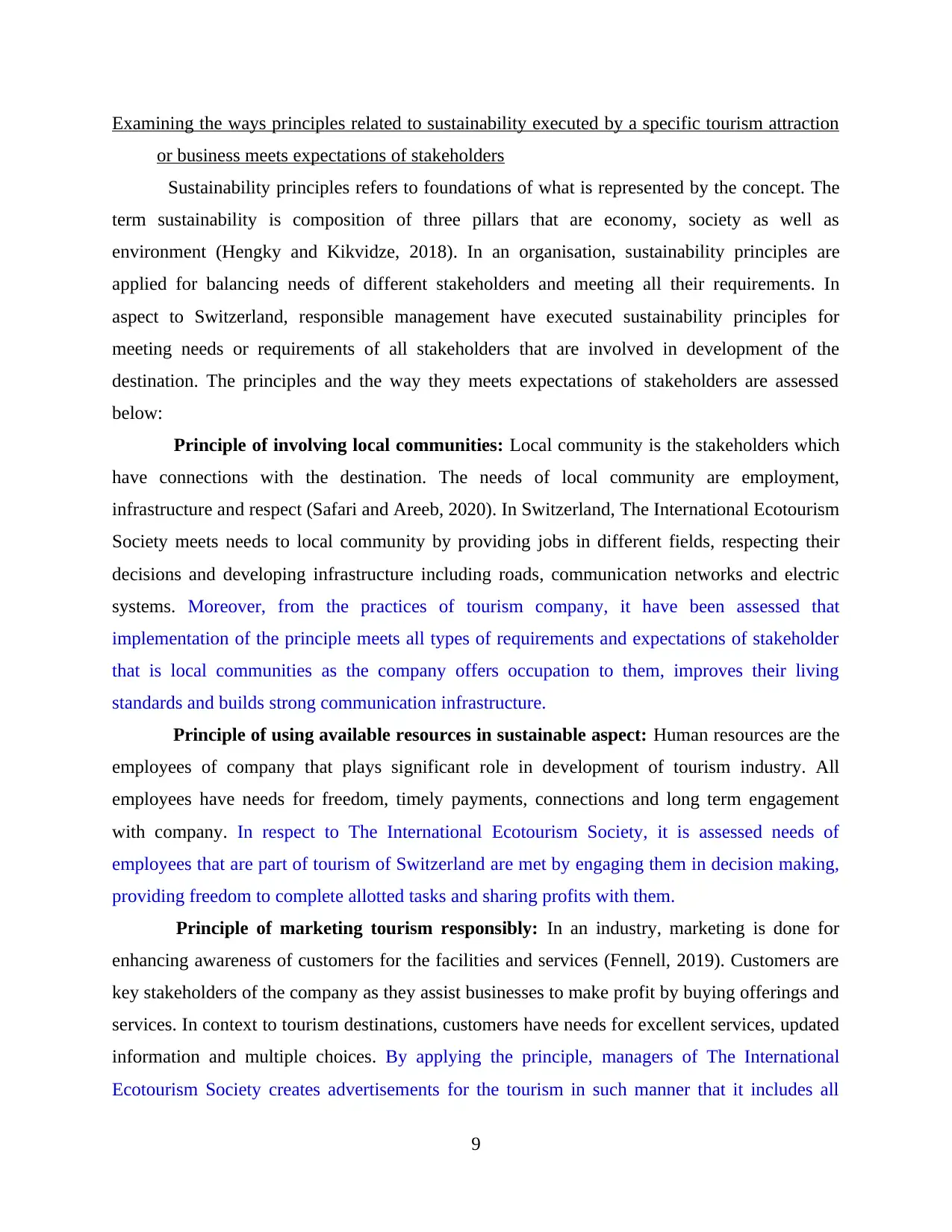
Examining the ways principles related to sustainability executed by a specific tourism attraction
or business meets expectations of stakeholders
Sustainability principles refers to foundations of what is represented by the concept. The
term sustainability is composition of three pillars that are economy, society as well as
environment (Hengky and Kikvidze, 2018). In an organisation, sustainability principles are
applied for balancing needs of different stakeholders and meeting all their requirements. In
aspect to Switzerland, responsible management have executed sustainability principles for
meeting needs or requirements of all stakeholders that are involved in development of the
destination. The principles and the way they meets expectations of stakeholders are assessed
below:
Principle of involving local communities: Local community is the stakeholders which
have connections with the destination. The needs of local community are employment,
infrastructure and respect (Safari and Areeb, 2020). In Switzerland, The International Ecotourism
Society meets needs to local community by providing jobs in different fields, respecting their
decisions and developing infrastructure including roads, communication networks and electric
systems. Moreover, from the practices of tourism company, it have been assessed that
implementation of the principle meets all types of requirements and expectations of stakeholder
that is local communities as the company offers occupation to them, improves their living
standards and builds strong communication infrastructure.
Principle of using available resources in sustainable aspect: Human resources are the
employees of company that plays significant role in development of tourism industry. All
employees have needs for freedom, timely payments, connections and long term engagement
with company. In respect to The International Ecotourism Society, it is assessed needs of
employees that are part of tourism of Switzerland are met by engaging them in decision making,
providing freedom to complete allotted tasks and sharing profits with them.
Principle of marketing tourism responsibly: In an industry, marketing is done for
enhancing awareness of customers for the facilities and services (Fennell, 2019). Customers are
key stakeholders of the company as they assist businesses to make profit by buying offerings and
services. In context to tourism destinations, customers have needs for excellent services, updated
information and multiple choices. By applying the principle, managers of The International
Ecotourism Society creates advertisements for the tourism in such manner that it includes all
9
or business meets expectations of stakeholders
Sustainability principles refers to foundations of what is represented by the concept. The
term sustainability is composition of three pillars that are economy, society as well as
environment (Hengky and Kikvidze, 2018). In an organisation, sustainability principles are
applied for balancing needs of different stakeholders and meeting all their requirements. In
aspect to Switzerland, responsible management have executed sustainability principles for
meeting needs or requirements of all stakeholders that are involved in development of the
destination. The principles and the way they meets expectations of stakeholders are assessed
below:
Principle of involving local communities: Local community is the stakeholders which
have connections with the destination. The needs of local community are employment,
infrastructure and respect (Safari and Areeb, 2020). In Switzerland, The International Ecotourism
Society meets needs to local community by providing jobs in different fields, respecting their
decisions and developing infrastructure including roads, communication networks and electric
systems. Moreover, from the practices of tourism company, it have been assessed that
implementation of the principle meets all types of requirements and expectations of stakeholder
that is local communities as the company offers occupation to them, improves their living
standards and builds strong communication infrastructure.
Principle of using available resources in sustainable aspect: Human resources are the
employees of company that plays significant role in development of tourism industry. All
employees have needs for freedom, timely payments, connections and long term engagement
with company. In respect to The International Ecotourism Society, it is assessed needs of
employees that are part of tourism of Switzerland are met by engaging them in decision making,
providing freedom to complete allotted tasks and sharing profits with them.
Principle of marketing tourism responsibly: In an industry, marketing is done for
enhancing awareness of customers for the facilities and services (Fennell, 2019). Customers are
key stakeholders of the company as they assist businesses to make profit by buying offerings and
services. In context to tourism destinations, customers have needs for excellent services, updated
information and multiple choices. By applying the principle, managers of The International
Ecotourism Society creates advertisements for the tourism in such manner that it includes all
9
⊘ This is a preview!⊘
Do you want full access?
Subscribe today to unlock all pages.

Trusted by 1+ million students worldwide
1 out of 16
Related Documents
Your All-in-One AI-Powered Toolkit for Academic Success.
+13062052269
info@desklib.com
Available 24*7 on WhatsApp / Email
![[object Object]](/_next/static/media/star-bottom.7253800d.svg)
Unlock your academic potential
Copyright © 2020–2026 A2Z Services. All Rights Reserved. Developed and managed by ZUCOL.





